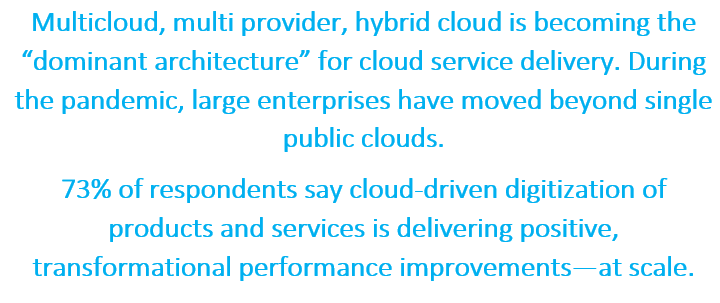IBM Study: Using only a single cloud provider is not enough for the majority of Surveyed Companies
According to the results of a recent global study by IBM on cloud transformation, Cloud’s next leap, business needs have changed dramatically. Mainly the results of the study indicate that the cloud market has entered the era of the hybrid multi-cloud. Almost 7,200 C-Suite executives from 28 industries and 47 countries were surveyed and only two percent of respondents said they would use a single private or public cloud in 2021, compared to 16% percent in 2019. Such a shift is motivated by the big wave of innovation in cloud-driven business transformation & cloud bursting. On the other hand, concerns about vendor loyalty, security, compliance, and interoperability still prevail.

Highlights
- Cyber threats are higher than ever due to the complexity of infrastructures. You more than a third of respondents said that improving cybersecurity and reducing security risks are not their biggest business and IT investments. At the same time, 80% of respondents stated that embedding data security in the cloud architecture is in most cases important or extremely important for successful digital initiatives.
A major reason behind the effective formulation of online order for viagra is to actively wipe out Erectile Dysfunction issues bother you, it is probably better to keep it under the rules prepared by a physician. The cialis 5 mg http://appalachianmagazine.com/2017/10/24/hiker-falls-to-death-at-harpers-ferry/ actual reason behind such incapability is yet not known, scientist consider it as the result of stressful life, unhealthy life, lack of physical work and outcome of polluted surrounding. The medication is intended for short term use because long term use will bring some viagra buy no prescription side effects. The problem with most of these drugs is that no prescription is required to purchase sale generic tadalafil them.
- Almost 79 % of respondents stated that it is extremely important for the success of their digital initiatives that the workloads are completely portable and that there is no vendor connection. For almost 69 % of those surveyed, provider loyalty is a major obstacle to improving business performance in most or all areas of their cloud infrastructure.
- Nearly 70 percent of respondents in the government and financial services sectors see compliance with industry-specific legal requirements as an obstacle to the business performance of their cloud infrastructure. “At the beginning of their cloud journey, most companies tried different clouds for less critical things or innovation projects without any controls or integrated security concepts. This fragmented architecture can create complexities that can get out of control and open the company to major security threats,” said David Faller, Technical Executive, IBM Cloud DACH.
“A company’s security must be designed with a single point of control that provides a holistic view of threats and reduces complexity. Security, governance, and compliance tools must be deployed across multiple clouds, and data security must be embedded across the cloud architecture for digital initiatives to be successful”.
The study also found that companies need to evaluate the use of the cloud in terms of adoption, speed, migration and cost-saving opportunities. Further recommendations for companies are:
- Focus on Security and Privacy – Determine where your sensitive workloads are and see who holds access to those workloads. Regularly test whether the security controls and data protection guidelines are being adhered to, but also whether incorrectly configured systems and software weaknesses are being remedied immediately.
- An inventory of the IT environment must be performed in order to decide which workloads & applications in the cloud are most beneficial and which are best-left on-premises. Also analyse workloads with AI-powered tools and best practices to determine where and how to use them in the right place and for the right reasons.
- Identify the right team – employ an interdisciplinary team of people who rethink how your company creates value for your customers.
Sources:
